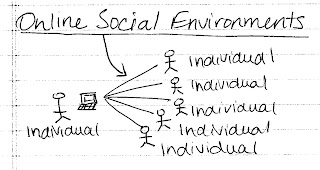Usually, when I blog, it's to talk about how awesome (or slightly less so) games are; but sometimes, I like to go a little off the deep end and apply my knowledge about social constructs to the design and play of video games. Today, I wanted to talk a little bit about online social environments and how they influence, impact, and have changed the way we game.
Gaming in social environments is not a new concept by a long shot. Only recently did the scope of social environments involved in gaming expand exponentially. An online social environment is a community (best defined by Pillari & Newsome as "[a social system] by the personal or affective ties among their members ... people with a common identity and bond"). This community's
common identity is the game play. And whereas many communities form in geographical locations, the space in which this community meets is virtual: the online social environment.
Before I lose you, here's a graphic representation of community (as we traditionally have understood it) and how an online social environment might be perceived.
Traditionally, communities are formed of cohesive groups of individuals - the community representing the focus of support for the individuals creating the group. However, with online social environments, we are looking more at structures created (sometimes manufactured, sometimes grown organically) between individuals linked together through network connectivity (also known as the interwebz).
Okay, so what? Well, the creation (especially the manufactured creation) of online social environments remains a major issue in online social gaming. Everything from Facebook games to World of Warcraft create and utilize online social environments. These are the foundations for which the game is designed, developed, and eventually, driven. Where the theories of community development come into play are in considering how the environment and the individual interact.
There are two concepts of environment when considering systems theory. I know I'm on the cusp of losing you again, so here's another drawing:
So, a symmetric environment (also sometimes called a symbiotic environment) influences the individual and the individual influences it. Theoretical democracy is a symmetric environment. An unbalanced, or directive environment is one which shapes the individual. Online social environments can be applied to either category. Consider a server community on Minecraft, for example. This is a very symmetric environment - users create based on the materials available; the environment is shaped by users and provides the materials for construction (and also, Creepers).
 |
That'sss an awfully nice ssssocial environement you have there.
It'd be a ssssshame is ssssomething happened to it... |
But not all games with online social environments work so nicely. Let's take my arch-nemesis Farmville for a ride: users have little-to-no interactive ability with the environment, save for cosmetic changes. There is little environment to speak of, because Farmville holds all the cards. And rightfully so! Relying on microtransactions would become difficult if you enabled community members to openly interact (especially on an economic basis).
I don't want to go crazy into economics, but there is a huge problem between manufactured online social environments and profit motivation theory. The notion to create a symmetric environment may be at diametric odds with the notion of creating a revenue generating environment. So, in a capitalist based society, profit may beat out community development.
Because of this (I promise, the econ is almost done) profit problem, organically created online social environments tend to thrive more, because they are naturally uninhibited by those constraints that would generally plague a manufactured environment.
Of course, that sounds delicious to an investor. Like wanting to capitalize on viral marketing, there is no magic bullet to ride the coattails of Web 2.0 to instant profit. The motivation differences create a series of problems, lead to social entropy, and the decay (and eventual death) of the online social environment.
If you are an avid gamer, developer, or investor, I strongly recommend that you continue your investigation into online social environments - how we impact them, and them us. Better understanding our mechanical interactive world can help make it better, not just for us, but for everyone else we share the community with; which, really, is what community is all about.













